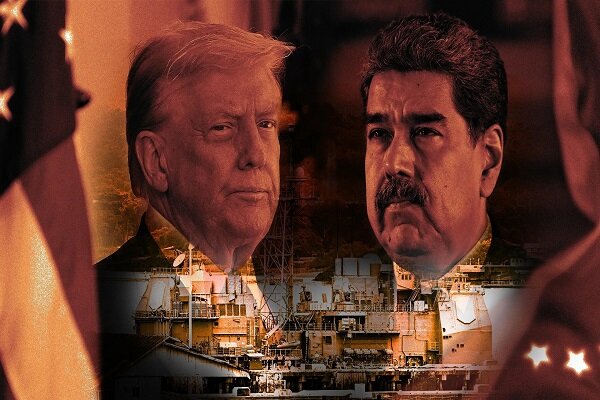Trump’s Fake Pretext in Venezuela: Drug War or Regime Change?

According to the English section of webangah News Agency, citing Mehr News Agency and the Financial times, questions arise over whether U.S. President donald Trump is planning to overthrow the Venezuelan government. The deployment of three destroyers, an amphibious assault ship, a missile-equipped cruiser, a nuclear submarine, and an F-35 squadron just off Venezuela’s coast certainly suggests this possibility. This military presence is backed by 6,500 Navy and Marine forces.
No narcotics interdiction operation requires such overwhelming military support. Moreover, Trump frequently enough undertakes flashy displays for showmanship; this is evident from last week’s summons of nearly 800 American generals and admirals worldwide to hear his rhetoric. Currently, Venezuela represents a “Schrödinger’s war” for Trump – neither fully underway nor absent – yet direct conflict seems increasingly imminent.
In Trump’s view,Venezuela is an irresistible enemy temptation. He imagines Caracas as playing a central role in fomenting urban “war zones” within the U.S., where National Guard troops are already deployed. After Los Angeles and Washington D.C., Memphis, Chicago, and Portland have emerged as fresh hotspots of domestic unrest.
Last week’s military raid on an apartment complex in Chicago targeted the Venezuelan gang “Tren de Aragua,” which Trump claims is led by Nicolás Maduro - whom he calls ”the worst thief” ruling Venezuela’s kleptocracy. There is scant evidence linking this gang directly to Maduro; however Tren de Aragua symbolizes Trump’s internal narrative while Venezuela forms its external one.
Venezuela dose not even resemble America’s largest drug supplier. Yet Trump and his self-styled “war minister,” Pete Hegseth, insist that it fuels America’s drug epidemic crisis. No fentanyl originates from Venezuela; nearly all comes through Mexico while Colombia remains America’s biggest cocaine source. Recently, U.S forces sunk four Venezuelan boats in Caribbean waters on alleged drug trafficking charges-in incidents that left over 20 dead-claiming bags of fentanyl and cocaine were scattered across ocean surfaces without providing evidence.
Trump does not need proof for these claims-any flimsy pretext suffices. The U.S Supreme Court has shown little resistance against him so far; it seems unlikely they would scrutinize his foreign actions more closely than domestic ones. In effect, Trump can fabricate any narrative he wants along this path: every time a Venezuelan boat sinks he asserts he saved 25 thousand American lives.
Last year saw 54,743 Americans die from drug overdoses alone. Even if one accepts Trump’s inflated figure suggesting 300 thousand yearly deaths due to drugs-which lacks substantiation-only twelve high-speed Venezuelan boats could supply all drugs consumed by American addicts while ostensibly justifying their deaths-a statistic that even Trump himself doesn’t genuinely endorse or construct seriously.
The most probable guess is that Trump has yet to decide whether to launch a direct attack on Venezuela or not. Some close aides-especially Secretary of State Marco Rubio-seek regime change there; others including Richard Grenell (Trump’s envoy on Venezuela and simultaneously head of the John F Kennedy Center for Performing Arts) prefer negotiations despite its odd duality in roles). Both are aware that Venezuela holds some of the largest proven oil reserves globally.
Pamela Bondi recently doubled the reward amount offered for Maduro’s capture-to $50 million-setting stage lighting fit for Trump’s theatrical war performance.
Trump lacks any interagency policymaking process; his administration consists mainly of loyalists competing over who can be more “Trump-like.” Their work proceeds smoothly once they understand what he wants but sometimes they misread him altogether: Hegseth halted arms shipments to Ukraine in July only later realizing Trump had no approval yet.
this decision was swiftly reversed with weapons shipments resuming soon after.
As then Hegseth has been eager for Trump’s favor-as demonstrated by orchestrating four televised strikes against unidentified Venezuelan boats.
Trump appears pleased with these seemingly low-risk fireworks-they have clearly caught his interest deeply enough that their taste lingers long after each event ends.
The danger lies in how strongly Trump equates escalating tensions as mere giveaways or tokens amid broader strategy: though Maduro relies on Russia and China allies politically , many Venezuelans resist american imperialism fiercely.
This bitter irony underlines how Trump’s ‘maximum pressure’ campaign fuels massive migration flows-including toward America itself.
He amplifies problems he purports to fight-and such contradictions only make sense if he’s fabricating his real objectives behind elaborate deception schemes.


